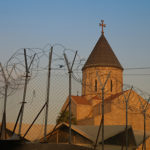The age of mission is not over. But the style and method of missions is forever changed.
In The World is Flat, Thomas Friedman talks about a triple convergence of the wall, the mall and the players. He describes the fall of the wall of communist ideology, the new access to free markets and the new players rushing onto the field.
A global triple convergence is happening in the field of Christian mission. The walls of denominationalism, hierarchies and continents have come down. Neither distance nor time matters. The playing field has changed, demanding a new way of working. Now the field is flooded with new players.
Seventy percent of the world’s Christians are in the Southern Hemisphere, Africa, Latin America and in the eastern bloc of South East Asia and China. In a flat world, doing mission is increasingly a horizontal collaboration. The majority-world church is jettisoning the former western approach and engaging in the mission of God very holistically. Evangelism and church planting are important. But they are very New Testament in not fragmenting the needs of people into sacred and secular categories.
Christ died for the whole person. The mission of God is a kingdom agenda.
Baylor University’s School of Social Work is committed to educate men and women for worldwide leadership through integrating academic excellence and Christian commitment within a caring community. Proof of that commitment is a new program launched this year called Global Mission Leadership.
Experienced Christian community development leaders from East and Southeast Asia were chosen for the inaugural launch of the program. These students traveled to Waco from their countries and will engage in both theological and social work training.
Sovannara Moch, a Cambodian woman, is one of those students. Moch wants to help the children of her country escape crushing poverty that often leads to enslavement in the global sex-trafficking industry. “I believe that God loves me equally as those who are hurting and those who hurt others, too,” she explained. “God has called me and put a passion in my heart to serve the hurting and the oppressed.”
Moch and the other chosen students will return home for three weeks at the end of the first semester, return to Waco for another year of study, then accomplish their internships back in their home countries—a contextualized equipping process. Upon completion of their work in about two years, they will have in hand a certificate in theological studies and a degree in social work. That is the first part of the equation.
Sign up for our weekly edition and get all our headlines in your inbox on Thursdays
Now comes the exciting part. The students entered into a covenant agreement to become disciplers—trainers of trainers. The program is designed to reproduce itself continuously. The initial training process in Waco and another country enables the School of Social Work to multiply itself many times over without engaging in a brain-drain from any one country. Eureka!
Friedman quotes the Indian magazine Outlook that describes that country’s “Liberalization” children known as Zippies. They are young city or suburban residents with a zip in their stride. They belong to Generation Z, male or female, studying or working. They ooze with attitude, ambition and aspiration. Cool, confident and creative, they seek challenges, love risk and shun fear. That is what 21st century mission calls for—a host of missio-zippies who seek challenges, love risk and shun fear. The Global Mission Leadership program of the School of Social Work at Baylor is at the cutting-edge of producing those kinds of leaders.
Bill O’Brien is a visiting mission scholar-in-residence at Baylor University’s Truett Theological Seminary in Waco.














We seek to connect God’s story and God’s people around the world. To learn more about God’s story, click here.
Send comments and feedback to Eric Black, our editor. For comments to be published, please specify “letter to the editor.” Maximum length for publication is 300 words.